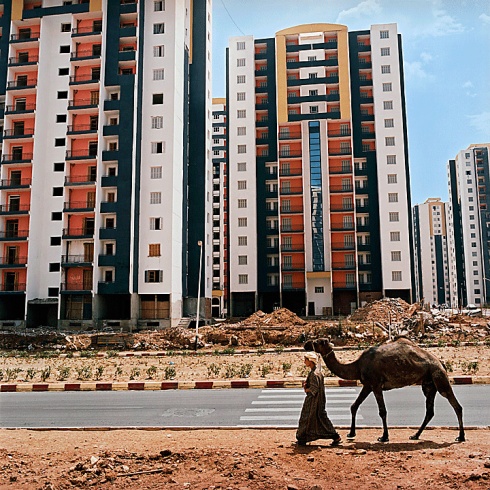Housing in Algeria: Several Forms, One Problem

The housing crisis in Algeria is one of the biggest domestic problems that each successive government has failed to resolve, including the failure to mitigate the impacts of failing policies within the housing sector. It is one of the primary causes of social tension and the source of many of the protests that Algeria recently witnesses.
The capacity of national housing, which is about 6 million units, cannot seem to accommodate the mounting demand. This shortfall has accumulated for years, especially with the increasing population growth.
The state has adopted the Algerian National Policy to control this problem, bringing it to “acceptable levels” through installing a policy of social housing to enable all people access to housing. This comes as a kind of compensation for the sacrifices of the people during the anticolonial revolution, particularly in the countryside, whose population was the most affected by the French colonizers’ ”scorched earth” policy.
The methods adopted toward the success of this policy are as follows:
• Rural housing is directed to rural areas, where the applicant for housing obtains a 700,000-dinar grant from the state, in order to build a home, respecting the needs of the region. The goal of this method is to affirm stability and to preserve the rural character of these areas;
• Social housing is directed to disadvantaged, or low-income communities, and fully supported from the public treasury;
• Social covalent housing depends on a subsidy for home tenure, offering part of the state subsidy for middle-income people. The beneficiary has to pay the remaining amount on installments, which has been agreed upon with some real-estate companies;
• Purchase by installments is one of the primary methods used to assist in assuring access to housing, meeting a great demand in Algeria. Many have relied on this option to alleviate the effects of the housing crisis, in order to buy a house in installments, without interest, provided that the beneficiary earns a middle income or above.
Despite all these methods and programs that reflect an effort to contain the housing crisis in Algeria, it has become clear that the principle policy failure is rooted in corruption in the distribution process and selection of. Senior officials in the public-housing sector have confessed that specific people benefit from many units and re-sell them at higher prices. The result of this corruption is that apartments in an upscale neighborhood in the Algerian capital are more expensive than similar apartments in Spain. This problem has spread, while mechanisms to monitor housing ownership have been installed.
Speculation, corruption and weak control have formed a triad of faults that affects all of the above-mentioned housing programs, especially given that the absence of political will to combat this trinity allows many parties to take advantage of this system, through bribery and nepotism, with impunity.
Another flaw lies in the fact that responsibility of distributing houses is given to administrative authorities who are designated by the central authority rather than elected, and civil society is largely excluded from the distribution and control mechanisms. These conditions enable the corruption and weak controls of the housing programs, which is the primary factor of devastation to any national effort, and in this case, housing policy.
It has become clear that the poor distribution of housing is the agitating factor for various protesting movements, whether violent or peaceful. It is clear that corruption in the distribution process is the trigger of many protests, as they typically erupt whenever the authorities announce the list of beneficiaries for the various housing programs mentioned above. Clearly, this corrupt pattern threatens national security and social stability, and requires a firm and honest stand to overcome. The ramshackle houses and tin slums that are spreading over in chaotic fashion are further evidence of the failure of housing policy in Algeria, which requires a critical review, evaluation and deep reform.
|